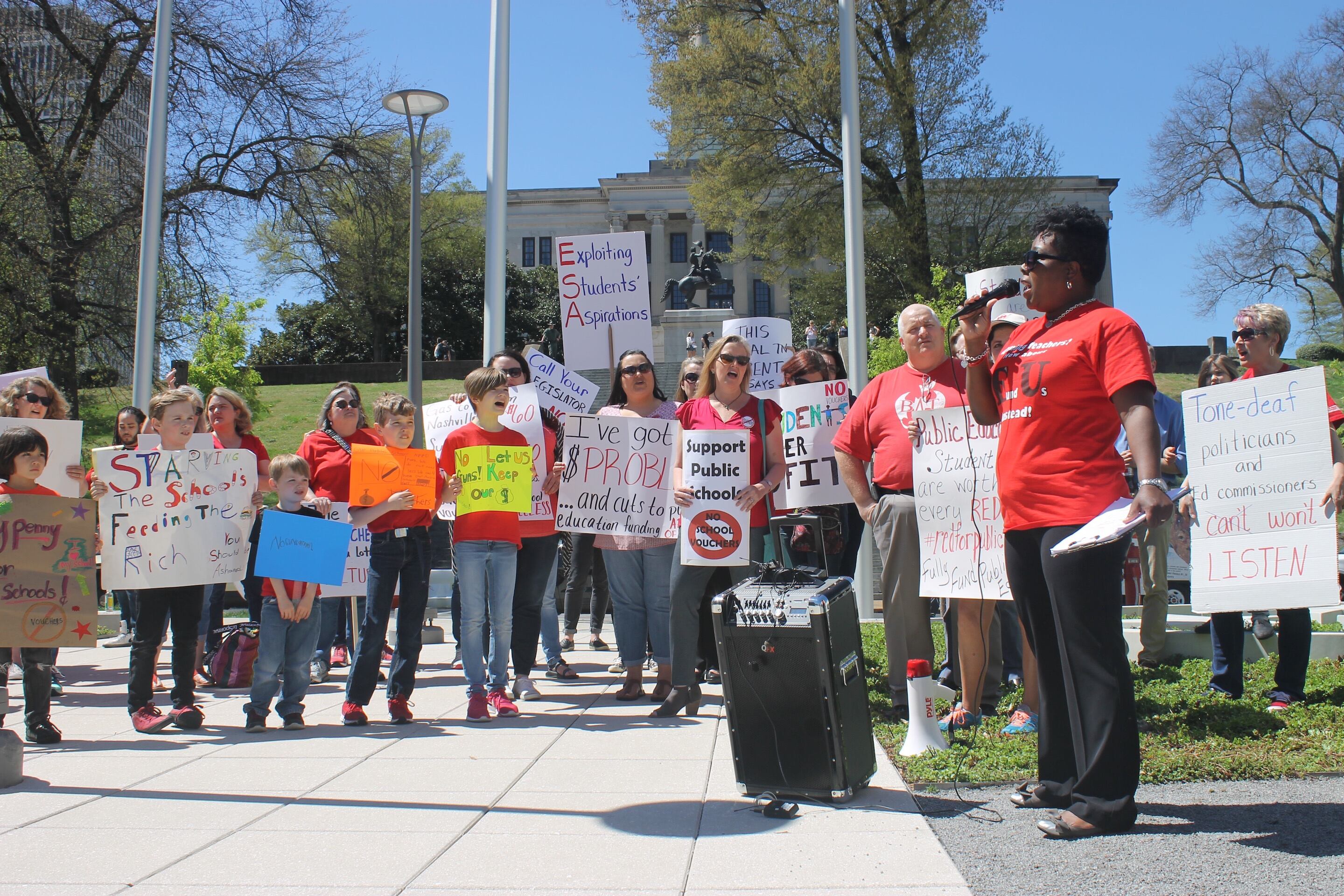Whether characterized as an assault on public schools or a pathway for more education choices for families, this week’s Tennessee Supreme Court ruling in favor of the state’s embattled school voucher law stirred a torrent of public feedback.
Reactions to the 3-2 decision split largely along partisan lines, bringing cheers from many Republicans, including Gov. Bill Lee, who said that the ruling “puts parents in Memphis and Nashville one step closer to finding the best educational fit for their children.”
Wednesday’s ruling revives Lee’s education savings account program, which lets eligible families use taxpayer dollars toward private school tuition or other private educational services. But it doesn’t guarantee the program’s survival.
The decision overturned lower court rulings in favor of the governments of Shelby County and Metropolitan Nashville, which argued that the 2019 law violated the Tennessee Constitution’s “home rule” provision, because it applied only to districts in Memphis and Nashville without local consent.
But several other legal avenues remain open to challenge the law, including a second lawsuit filed in 2020 on behalf of 11 public school parents and community members in Memphis and Nashville based on their students’ constitutional rights to adequate and equitable educational opportunities.
The plaintiffs in that case “have asserted these constitutional claims from the beginning of the litigation challenging the voucher law, and intend to vigorously pursue them,” said a joint statement from the Education Law Center, Southern Poverty Law Center, and the ACLU, which are collaborating on the litigation.
Local governments in Shelby and Davidson counties also could pursue other legal claims.
Here’s what Tennesseans are saying about this week’s long-awaited ruling:
Memphis-Shelby County Schools: “The recent ruling is an unfortunate roadblock on the path toward progress and makes serving students in the state’s largest urban district even more challenging.”
Adrienne Battle, director, Metropolitan Nashville Public Schools: “Private school vouchers undermine our public schools and have failed to support the learning needs of students who have used them in other states where they have been tried. We strongly disagree with the court’s opinion, which undermines the principles of local control and will harm Davidson County taxpayers who will ultimately be on the hook to pay for the state’s voucher scheme.”
Rep. Mark White, R-Memphis: “Our first priority in government is to build strong public schools. But where that is not available, school choice should be an option.”
Kay Johnson, director, Greater Praise Christian Academy, Memphis: “I am overjoyed by the court’s ruling. This program gives students in poor-performing schools the opportunity and support to attend the schools that best suit their needs. That is a win for them, their families, our communities, and our state.”
Sen. Heidi Campbell, D-Nashville: “This could not be worse for Tennessee children in tandem with the bill to transition our entire education program into evangelical hedge-fund schools. This is terrible news for our state.”
Rep. Antonio Parkinson, D-Memphis: “The fact that Davidson and Shelby County taxpayers are singled out as the only counties in the state of Tennessee where the taxpayers are forced to use their tax dollars to fund private school enrollment is absurd and discriminatory. And even more dangerous and disturbing is the precedent this decision sets for the Tennessee General Assembly to continue, with the backing of the highest court in the land, to dump other shit legislation only on the people of these counties.”
John Patton, Tennessee director, American Federation for Children: “The Tennessee Supreme Court made the right decision by declaring that the Education Savings Account program does not violate the HomeRule Amendment. These programs encourage both private and public schools to create new and better options for all students.”
Tennessee Attorney General Herbert Slatery III: “The Education Savings Account program has always been about helping Tennessee students — giving eligible families a choice in education, an opportunity they currently do not have. It challenged the status quo, a move that is always met with resistance. … While there are further court proceedings that need to take place, this is a major step forward.”
Beth Brown, president, Tennessee Education Association: “This ruling is not the end of the fight against private school vouchers. We’ve seen the privatization industry’s playbook come to life in other states and witnessed the damage caused to students and public schools. They start a small program, then expand it, and then expand it a little more, until public education funding is obliterated.”
Tennessee Senate Democratic Caucus: “In this decision, the Supreme Court erased constitutional protections for local control and years of precedent. Not only does this decision usher in a terrible education policy, but it invites more political meddling that surely results in local governments losing freedom and independence from state interference.”
Raymond Pierce, president and CEO, Southern Education Foundation: “There is a long and well-documented history of school voucher programs in the South being used to avoid integration by siphoning public funds out of public schools. … While this law stands for now, the Southern Education Foundation will continue to fight school privatization efforts that would take our nation back to the days of a segregated and inherently unequal education system.”
Justin Owen, president and CEO, Beacon Center of Tennessee: “We are so pleased that the Tennessee Supreme Court affirmed what we have always known: the ESA law is not a violation of the Tennessee Constitution’s Home Rule Amendment. We are fully confident after this decision that families in Nashville and Memphis will finally get the choice opportunities that they deserve.”
Victor Evans, executive director, TennesseeCAN: “A student’s ZIP code or neighborhood should never dictate their future, but without the options and resources that those from wealthier areas enjoy, that is too often the case. Tennessee’s Educational Savings Account program will help address this glaring inequality and need.”
TJ Ducklo, spokesman for Nashville Mayor John Cooper: “We’re disappointed by today’s ruling but will continue to vigorously fight this law through all possible avenues.”
JC Bowman, executive director, Professional Educators of Tennessee: “Legal experts will continue to debate this case on its merits for many years, and it may still face additional legal challenges. The Tennessee Education Savings Account will ultimately be defined by the students who participate in the program and their academic success or failure. Public schools will remain the choice of the vast majority of parents in our state who believe their child is receiving a high-quality education.”
Marta Aldrich is a senior correspondent and covers the statehouse for Chalkbeat Tennessee. Contact her at maldrich@chalkbeat.org.








